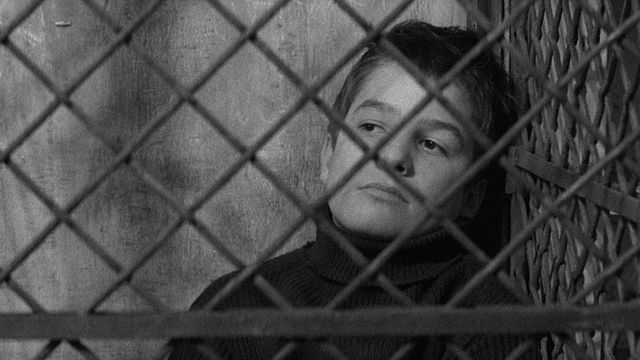Les quatre cents coups (1959) 
“Angel faces hell-bent for violence.”

Director: François Truffaut
Cast: Jean-Pierre Léaud, Albert Rémy, Claire Maurier
Synopsis: Intensely touching story of a misunderstood young adolescent who left without attention, delves into a life of petty crime.
The making of his debut movie Les quatre cents coups (The 400 Blows) must have been a nerve-wracking experience for Francois Truffaut; one of the most aggressive of the Cahiers du Cinema critics, Truffaut was not averse to lambasting the works of such accepted French masters as Rene Clair and Marcel Carne, and was laying himself wide open for a critical mauling when he took up his movie-distributor father-in-law’s challenge to put his money where his mouth was and make a movie of his own. However, with Les quatre cents coups Truffaut was to prove conclusively that, not only did he know what he was writing about, he also knew how to put his cinematic theories into practice. Not only did he create a sublime and perceptive portrait of a young boy’s drift into delinquency, he also helped to revolutionise the art of film-making throughout the world.
Concealed beneath a series of deceptively simple vignettes, Les quatre cents coups is a complex examination of the destructive forces at work on an intelligent and creative, but misunderstood and neglected, Parisian child. Although no naughtier than the average child , Antoine Doinel (Jean-Pierre Leaud) is forever finding himself in trouble, either with his teachers, his parents, or the authorities; sharing a cramped apartment with his unloving mother and largely ineffectual father, Antoine is regularly singled out for punishment by his bad-tempered teacher. During the course of the film, a series of incidents result in Jean-Pierre running away from home and turning to a life of petty crime before inevitably ending up in a centre for juvenile delinquents.
Based on Truffaut’s own troubled childhood, Les Quatre Cent Coups, (which roughly equates to ‘raising hell’ in English) looks as fresh today as it must have done when first released nearly half-a-century ago. In fact, were it not for the tell-tale fashions and designs of the 50s, anyone unfamiliar with the movie would be hard-pushed to place it within any period during the last 50 years. And, by the same measure, it is completely different from anything that had gone before, either in France or abroad. Embracing all the principles of the style of film-making that would come to be known as New Wave, Truffaut allowed his camera to simply observe the daily routine of young Antoine, never judging or criticising any of its characters, while firmly placing the viewer amongst the characters. There is no plot to speak of, but a faithful presentation of a sequence of events that, although rooted in the mundane, range from quietly heartbreaking to achingly lyrical. In one justly famous scene — that would probably be cut if the same film were to be made today — the camera lingers on the faces of a group of young children watching a puppet show, and brilliantly captures the innocence we all once possessed, and that is now slipping away from Antoine; at the age of twelve, he is already on the cusp of corruption, and the children’s world of innocent wonder is closed to him. It is an incredibly simple, yet equally powerful, scene.
In Antoine Doinel, Truffaut has created a character that will remain with the viewer long after that famous final stop-motion zoom shot; he’s spirited, irrepressible and impulsive, and suffers the consequences of these qualities — and the petty cruelty of the adults around him — with an unquestioning stoicism that suggests it is the only kind of treatment he has ever known. Fated to suffer setbacks at everything he attempts — an essay written in homage to Balzac is interpreted as plagiarism by his teacher, and the tiny shrine he builds to the author nearly burns down his flat — one suspects that, even at such an early age, he has already realised, and come to terms with, the fact that such will be his lot through life.
Leaud’s performance is simply stunning, and still stands as the greatest screen performance by a child actor. Watching him — and he is on screen for most of the film — one forgets one is watching an actor, so natural is his performance. Near the end of the movie, when Antoine is interviewed by a child psychiatrist, one can believe Leaud is relating episodes from his own life rather than following pre-determined lines. There is no precociousness here, no attempt to hijack the viewer’s emotions, and — as Truffaut has contested — Leaud effortlessly stamps his character on the role without allowing it to overwhelm the film.
The movie ends with a series of long shots that run with Antoine as he flees from the Juvenile Detention Centre. He runs with a single-mindedness of purpose and, as the camera faithfully runs with him, it is as if the film itself is breaking free of conventional cinematic techniques, as if it can’t bear to be parted from its subject. Finding the ocean he has always wanted to see, Antoine must, at last, stop running. He has escaped, if only for a little while, the past that has troubled him; but, frozen by Truffaut’s camera, that last look back suggests that, on some instinctive level, he realises he can never truly escape, and that still he will have to return to face his fate.
Les quatre cents coups is a true masterpiece that richly deserves its status as one of the greatest films ever made, and will endlessly reward the viewer, no matter how often it is revisited.
(Reviewed 25th October 2006)
httpv://www.youtube.com/watch?v=i89oN8v7RdY
